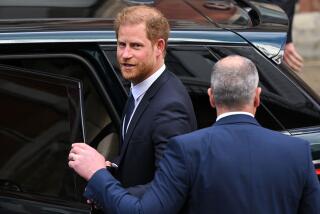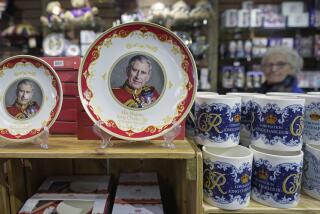Prince Philip Named to Represent Britain at Hirohito Rites
- Share via
LONDON — Choosing international protocol over domestic politics, Britain announced Monday that Prince Philip, the Duke of Edinburgh and Foreign Minister Geoffrey Howe will represent it in Tokyo next month for the state funeral of Emperor Hirohito.
The decision followed a weekend of public attacks here meant to pressure both the government and Buckingham Palace into boycotting the event, which critics say honors the man who, as Japan’s World War II monarch, bears at least part of the responsibility for the imprisonment and death of thousands of British and other allied soldiers.
Similar objections have been raised in other countries, notably Australia and the Netherlands, underlining the powerful passions lying just beneath the surface in many nations over events that took place half a century ago.
Hirohito died at age 87 early Saturday and is to be buried on Feb. 24.
In Washington, a spokesman for President-elect Bush’s transition team suggested that Bush himself would lead the American delegation to the funeral. Although he said there were no “firm plans,” transition co-chairman Craig Fuller told reporters: “I would expect that you may have a foreign trip in the first few months of the Administration.” Bush is a veteran of the Pacific theater in World War II.
Former prisoners of war who were among a reported 27,000 interned when Japanese forces overran British outposts in the Far East in the first days of the war are the most outspoken opponents of Monday’s decision.
“I’ll never forget, and I’ll never forgive the Japanese,” said Harold Payne, a spokesman for the Far Eastern Prisoners of War Assn.
Further complicating the palace’s position is its failure to send any member of the Royal Family to a memorial service in the tiny Scottish village of Lockerbie just last week. The service, for victims of the Flight 103 disaster, was attended by Prime Minister Margaret Thatcher and two other ministers.
“If protocol says that the Royal Family should join in mourning for Emperor Hirohito, but not take part in a simple service of remembrance for ordinary people at Lockerbie, then there is something very wrong with royal protocol,” commented Brian Wilson, the opposition Labor Party’s spokesman on Scottish affairs.
Responding to a phone-in survey by London Broadcasting Corp. Radio over the weekend, 62% of more than 900 listeners said no member of either the Royal Family or of the government should attend the Tokyo state funeral next month.
One caller, who identified himself only as a World War II veteran who served as a medic with the British forces in Burma, recalled treating men released from the Japanese work camps at the end of the war.
“They were absolutely skeleton, down to the bone. We nursed them back. We done the best. Some did die--couldn’t help it. And I can’t see any representation (at the funeral); no condoning for what they done to us. And I shall carry on like that for the rest of my days.”
Jim Bailey, chairman of the Assn. of Ex-Prisoners of War, said “any British representation at all . . . will be an insult” to survivors of the Japanese camps.
Others argued that it was time to forgive, if not forget, the past. “You have to try and go forward,” said an unidentified woman caller. “Otherwise, the world is never going to get anywhere.”
The selection of Queen Elizabeth II’s husband, Prince Philip, to represent the Royal Family was seen here as a gesture towards the palace’s critics. Previously, it had been reported that the queen would send her son, Prince Charles. But Philip, as a veteran of World War II service, is seen as more attuned to the sensitivities of the situation. He witnessed the Japanese surrender in 1945.
For the Royal Family to have boycotted the funeral would have been considered a huge slap in the face by the Japanese.
Hirohito’s role in the war is still a matter of controversy. Some analysts contend that he was little more than a figurehead manipulated by powerful and militaristic Japanese government ministers. Others argue that he had both the knowledge and the power to stop the drift into a conflict which proved history’s most costly, spawning the nuclear age.
And the debate here over attending his funeral has echoes elsewhere.
In Australia, the government said over the weekend that it will send a high-level delegation to the funeral but that Prime Minister Bob Hawke will not go.
Australia lost about 10,000 servicemen in Japanese POW camps, Britain’s Press Assn. news service reported.
In the Netherlands, which lost more than 20,000 people during Japan’s wartime occupation of the former Dutch East Indies (now Indonesia), the Dutch Royal Family has said it will have no representative at Hirohito’s funeral.
More to Read
Sign up for Essential California
The most important California stories and recommendations in your inbox every morning.
You may occasionally receive promotional content from the Los Angeles Times.










